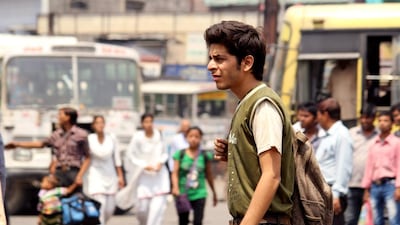Has Cannes discovered India's version of Martin Scorsese? Titli, produced by Yash Raj Films and directed by the 33-year-old Kanu Behl, made its debut in the Un Certain Regard section at the Cannes International Film Festival on Tuesday and was immediately touted as a possible Camera d'Or winner, the prize awarded to the director with the best first film screening.
It’s high praise for an edge-of-the-seat thriller that combines a love story with a gangster tale, with hints of Alfred Hitchcock, Scorsese and Jacques Audiard.
When I comment on the similarities to Scorsese, Behl says: "It's funny you should say that, as I came in to write the script, my co-writer Sharat Katariya gave me Mean Streets (1973) to watch."
Titli (butterfly) is the name of the principal male protagonist (Shashank Arora), a skinny twenty-something who is the youngest of three brothers, all gangsters. It's a stunning debut performance from Arora, who imbues Titli with a wide-eyed innocence. Born in New Delhi and having studied cinema and music in Montreal, Arora shines as the young kid who can't seem to escape the clutches of his older brother, played by Ranvir Shorey.
Behl was born in Patiala, in the north Indian state of Punjab, and is the son of the writers, actors and directors Navnindra and Lalit Behl, who portrays Titil’s father in the film.
“We moved to New Delhi when I was 12 or 13,” says Behl, “and growing up in a film-and-television household meant that I was exposed to the business. I used to be a child actor and I remember being woken up at 2am and being told: ‘Come on, you’re needed now.’ Because of this I developed a dislike of film and television and vowed never to get involved in the business.”
But Behl had a change of heart when he turned 18 – he discovered Emir Kusturica and “began watching as many films as possible”, with the intent of enrolling at the prestigious Satyajit Ray Film & Television Institute in Kolkata. It was at this stage that he became fascinated by the cinema of Kusturica, Abbas Kiarostami and Akira Kurosawa.
"At film school, I discovered documentaries. I made a short documentary for Arte France and two documentaries for NHK Japan. All three documentaries were about friends or family," says Behl. "Titli started out as a film about depression, about a young boy who wants to get away from his older brother. There were certain personal experiences that I wanted to include. But as we were writing the story, the oldest brother and the father developed into strong characters."
Behl’s schooling in documentaries is evident in the hand-held camera work of the cinematographer Siddharth Diwan, as Titli is followed around the streets of New Delhi.
And Behl's fascination with family life continues – the brothers fall out way more often than Raging Bull's (1980) La Motta brothers. "I wasn't looking at the film as if it was a thriller," Behl explains. "The core of the film has always been family."
What’s also remarkable, especially in a film that starts off being about the lives of four men, is the strength of the female characters.
“That happened totally by chance,” says the director. “The women in my film are like the women that I know and have lived with. They are just saying what I would think they would say in the situations that they are in. These are women who are struggling for a voice. If I were to be intellectual about it, I would say that they are a reflection of the transition that women in India are going through today.”
artslife@thenational.ae


